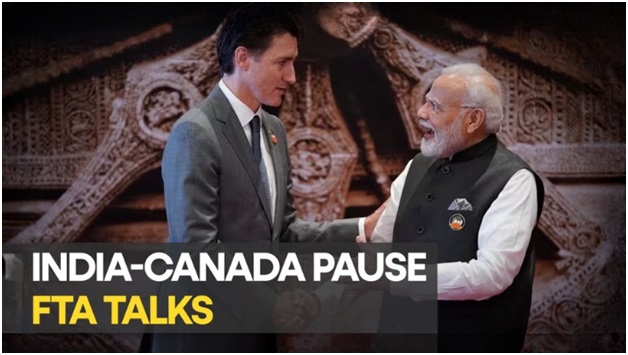India-Canada FTA Stalled (Indian Express)

- 18 Sep 2023
Why is it in the News?
Negotiations for a bilateral free trade agreement between India and Canada have been temporarily halted. This decision followed Prime Minister Modi's concerns about anti-India activities by extremist groups in Canada, which he discussed with Canadian Prime Minister Justin Trudeau during the G20 Summit.
Context:
- Negotiations on the Comprehensive Economic Partnership Agreement (CEPA) between India and Canada have been temporarily suspended due to political differences.
- Talks are expected to resume once these issues are resolved.
Possible Reasons for the pause:
- Strained Relations: The relationship between the two countries has become tense due to concerns related to pro-Khalistan groups operating in Canada.
- Diplomatic Actions: In July, India summoned the Canadian envoy and issued a formal demarche after posters naming senior Indian diplomats in Canada surfaced.
- Strong Response: Following a meeting between Prime Ministers Modi and Trudeau during the G20 Summit, India released a strongly-worded statement.
India-Canada Relations:
- Diplomatic relations between India and Canada were formally established in 1947. However, the partnership took a significant step forward when it was elevated to a strategic level during Prime Minister Modi's visit to Canada in 2015.
Commercial Relations:
- Bilateral Trade: The economic relationship between the two nations has witnessed substantial growth. India has become Canada's 10th largest trading partner.
- Trade Figures: In the fiscal year 2022-23, India's total exports to Canada amounted to US$ 4.10 billion, showing an increase from US$ 3.76 billion in the previous year.
- Simultaneously, India's imports from Canada reached US$ 4.05 billion in 2022-23, up from US$ 3.13 billion in 2021-22.
- Key Exports and Imports: The bilateral trade consists of a range of items. India exports gems, pharmaceutical products, ready-made garments, among others.
- In contrast, India imports commodities like pulses, newsprint, wood pulp, asbestos, potash, iron scrap, copper, minerals, and industrial chemicals from Canada.
- Investment: Canadian Pension Funds have made cumulative investments of around US$ 55 billion in India.
- Additionally, the cumulative Foreign Direct Investment (FDI) from Canada since the year 2000 amounts to approximately US$ 4.07 billion.
- CEPA/EPTA Negotiations: In March 2022, both countries agreed to re-launch negotiations for the Comprehensive Economic Partnership Agreement (CEPA).
- Furthermore, they explored the possibility of an interim agreement called the Early Progress Trade Agreement (EPTA), which could bring mutual commercial benefits.
- Negotiations on CEPA and EPTA resumed in April 2022 and continued through nine rounds of talks until July of the same year.
Nuclear Cooperation:
- Canada's nuclear aid to India began in 1956 and saw collaboration until 1974, when India conducted its nuclear test, Smiling Buddha.
- Canada was among the earliest participants in India's nuclear power program, notably contributing to the construction of CIRUS, India's first research reactor.
- The restoration of nuclear cooperation between the two countries occurred in June 2010 with the signing of a Nuclear Cooperation Agreement (NCA).
Science and Technology:
- Bilateral collaboration extends to various sectors, including joint research projects in healthcare, agri-biotech, and waste management under the IC-IMPACTS program.
- Furthermore, the Department of Earth Science and Polar Canada initiated a program for the exchange of knowledge and scientific research focused on Cold Climate (Arctic) Studies.
Cooperation in Space:
- Notably, the commercial arm of the Indian Space Research Organization (ISRO), ANTRIX, has successfully launched several nanosatellites from Canada.
- In a significant milestone, ISRO included Canada's first Low Earth Orbit (LEO) satellite on its 100th satellite PSLV launch in January 2018.
Development Cooperation:
- After 55 years of bilateral programming in India with a total aid of $2.39 billion, Canada's bilateral development assistance program came to an end in 2006.
- This change resulted from a shift in Indian government policy regarding aid.
- Presently, Canada supports various projects in India through Grand Challenges Canada.
- The main programming sector of the Partnerships for Development Innovation Branch focuses on maternal, newborn, and child health, including support for early childhood development.
Cooperation in Indo-Pacific:
- In November 2022, Canada unveiled its Indo-Pacific strategy.
- Although Canada is the last G7 nation to formally embrace the concept of the Indo-Pacific, its strategy emphasizes India's strategic importance.
- The document highlights India as a key partner and calls for close collaboration with the country.
People-to-People Relation:
- Canada is home to one of the largest Indian diasporas globally, numbering 1.6 million individuals (comprising Persons of Indian Origin - PIOs and Non-Resident Indians - NRIs), which constitutes more than 4% of its total population.
- In the political arena, the present Canadian House of Commons, with a total strength of 338, includes 22 Members of Parliament of Indian origin.
- Additionally, there has been an encouraging cultural exchange, symbolized by a commemorative Diwali stamp jointly issued by Canada Post and India Post in 2017.
- Furthermore, Diwali celebrations on Parliament Hill have been a tradition for 18 years.
Challenges in India-Canada Relation:
- Khalistani Groups: A significant challenge lies in Canada providing a safe haven for separatist Khalistani groups.
- New Delhi has expressed concerns regarding the Liberal Party's alleged alignment with these groups for political support.
- Some members of the Sikh diaspora, backed by pro-Khalistan groups, are politically active in Canada.
- Anti-India Elements: Concerns have also arisen about Canada's perceived slow response to address anti-India elements operating on its soil.
- Instances such as the vandalization of a Hindu temple near Toronto and the defacement of Indian symbols with anti-India graffiti have added to these concerns.
- Diplomatic Tensions: Occasional diplomatic tensions have arisen due to issues such as Canadian comments regarding India's farmer protests and India's subsequent cancellation of diplomatic talks in response.
- India-Canada relations are multifaceted, encompassing trade, investment, scientific collaboration, and more. However, they also face challenges related to certain groups and diplomatic issues."
